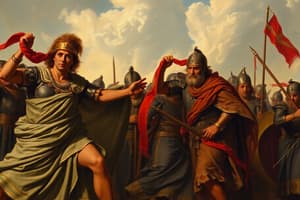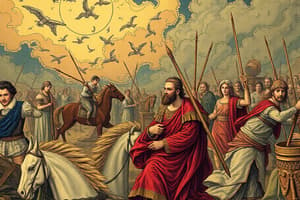Podcast
Questions and Answers
What is the primary concern of Antony regarding the enemy's actions?
What is the primary concern of Antony regarding the enemy's actions?
- They lack the courage to fight.
- They are occupying the high ground to intimidate. (correct)
- They are regrouping for a stronger attack.
- They are planning to retreat from the battle.
What strategy does Octavius suggest for the battle formation?
What strategy does Octavius suggest for the battle formation?
- He will take the right side of the field. (correct)
- He prefers to occupy the center of the field.
- He should lead the army from the front.
- He believes they should wait for the enemy to attack first.
How does Antony characterize the past actions of Brutus and Cassius?
How does Antony characterize the past actions of Brutus and Cassius?
- They were deceitful in their flatteries. (correct)
- They were cowardly and treacherous.
- They fought bravely for Caesar.
- They acted with honor and respect.
What does Brutus imply by stating, 'Good words are better than bad strokes'?
What does Brutus imply by stating, 'Good words are better than bad strokes'?
What does Cassius suggest about Antony's rhetoric in his speech?
What does Cassius suggest about Antony's rhetoric in his speech?
What does Antony refer to when he mentions 'the Hybla bees'?
What does Antony refer to when he mentions 'the Hybla bees'?
What does Octavius mean when he states 'the generals would have some words'?
What does Octavius mean when he states 'the generals would have some words'?
What does the term 'bloody sign of battle' imply in the context?
What does the term 'bloody sign of battle' imply in the context?
What does Brutus imply about dying in battle against traitors?
What does Brutus imply about dying in battle against traitors?
How does Cassius react to the omens he perceives before the battle?
How does Cassius react to the omens he perceives before the battle?
What underlying philosophy does Brutus reference when discussing potential loss in battle?
What underlying philosophy does Brutus reference when discussing potential loss in battle?
What is Cassius’s view about the current state of their army before the battle?
What is Cassius’s view about the current state of their army before the battle?
What does Brutus refuse regarding his potential fate if they lose the battle?
What does Brutus refuse regarding his potential fate if they lose the battle?
Which character expresses a sense of deep foreboding regarding their fate in the battle?
Which character expresses a sense of deep foreboding regarding their fate in the battle?
What literary device is prominently featured in the discussion between Brutus and Cassius about their fate?
What literary device is prominently featured in the discussion between Brutus and Cassius about their fate?
How does Brutus characterize fear concerning the uncertain outcomes of life?
How does Brutus characterize fear concerning the uncertain outcomes of life?
What does Cassius compare the current bad omens to?
What does Cassius compare the current bad omens to?
What is the main emotion expressed by Brutus towards the end of his conversation with Cassius?
What is the main emotion expressed by Brutus towards the end of his conversation with Cassius?
How does Antony interpret the enemy's decision to remain on the hills?
How does Antony interpret the enemy's decision to remain on the hills?
What does Octavius's insistence on waiting for a signal indicate about his approach to battle?
What does Octavius's insistence on waiting for a signal indicate about his approach to battle?
How does Brutus's statement, 'Words before blows' relate to the theme of honor in this scene?
How does Brutus's statement, 'Words before blows' relate to the theme of honor in this scene?
What does Antony's reference to 'flatterers' suggest about his view on loyalty and betrayal?
What does Antony's reference to 'flatterers' suggest about his view on loyalty and betrayal?
What rhetorical strategy does Antony employ when discussing the past actions of Brutus and Cassius?
What rhetorical strategy does Antony employ when discussing the past actions of Brutus and Cassius?
How does Cassius’s comment on Antony's words reflect the tension in the dialogue?
How does Cassius’s comment on Antony's words reflect the tension in the dialogue?
In what way does Brutus's assertion of 'good words' being better than 'bad strokes' resonate with classical ideas of rhetoric and warfare?
In what way does Brutus's assertion of 'good words' being better than 'bad strokes' resonate with classical ideas of rhetoric and warfare?
How does Octavius's response to Antony's command illustrate the complexity of their partnership?
How does Octavius's response to Antony's command illustrate the complexity of their partnership?
What does Cassius signify by stating that he is compelled to set upon one battle all their liberties?
What does Cassius signify by stating that he is compelled to set upon one battle all their liberties?
How does Brutus's philosophy influence his perspective on potential defeat in battle?
How does Brutus's philosophy influence his perspective on potential defeat in battle?
What ominous signs does Cassius interpret before the battle, and what do they symbolize?
What ominous signs does Cassius interpret before the battle, and what do they symbolize?
In what way does Brutus express his value for personal honor in the face of potential defeat?
In what way does Brutus express his value for personal honor in the face of potential defeat?
What is the significance of Cassius's reference to being born on the day of their battle?
What is the significance of Cassius's reference to being born on the day of their battle?
Describe Brutus's attitude towards death during the conversation with Cassius.
Describe Brutus's attitude towards death during the conversation with Cassius.
What role does the idea of omens play in Cassius's mindset before the battle?
What role does the idea of omens play in Cassius's mindset before the battle?
How does Brutus's dialogue with Lucilius reflect the themes of friendship and loyalty?
How does Brutus's dialogue with Lucilius reflect the themes of friendship and loyalty?
What does Cassius suggest about the consequences of losing the battle?
What does Cassius suggest about the consequences of losing the battle?
What does Brutus mean by stating, 'O, that a man might know the end of this day's business ere it come'?
What does Brutus mean by stating, 'O, that a man might know the end of this day's business ere it come'?
Flashcards
Battle of Philippi Location
Battle of Philippi Location
The battle took place on the plains of Philippi.
Octavius and Antony's Strategy
Octavius and Antony's Strategy
Octavius and Antony positioned their armies, Octavius on the right and Antony on the left.
Parley Request
Parley Request
Generals requested a formal discussion before battle.
Brutus's Defense
Brutus's Defense
Signup and view all the flashcards
Antony's Retort
Antony's Retort
Signup and view all the flashcards
Cassius's Criticism
Cassius's Criticism
Signup and view all the flashcards
Octavius's Commitment
Octavius's Commitment
Signup and view all the flashcards
Cassius's Omens
Cassius's Omens
Signup and view all the flashcards
Brutus's Philosophy
Brutus's Philosophy
Signup and view all the flashcards
Brutus-Cassius Farewell
Brutus-Cassius Farewell
Signup and view all the flashcards
Antony's Interpretation
Antony's Interpretation
Signup and view all the flashcards
Verbal Exchange
Verbal Exchange
Signup and view all the flashcards
Cassius's Birthday
Cassius's Birthday
Signup and view all the flashcards
Cassius's Doubt
Cassius's Doubt
Signup and view all the flashcards
Brutus's Farewell to Cassius
Brutus's Farewell to Cassius
Signup and view all the flashcards
Brutus's Capture Fear
Brutus's Capture Fear
Signup and view all the flashcards
Cassius's Fear
Cassius's Fear
Signup and view all the flashcards
Eagles replaced by ravens
Eagles replaced by ravens
Signup and view all the flashcards
Omens and Defeat
Omens and Defeat
Signup and view all the flashcards
Study Notes
Scene Setting
- The scene takes place on the plains of Philippi, where the armies of Octavius and Antony are facing off against the forces of Brutus and Cassius.
Battle Preparations
-
Octavius and Antony discuss the enemy's positioning, with Antony deducing they are trying to appear brave by coming down from the hills.
-
A Messenger informs them that the enemy is approaching and ready for battle.
-
Octavius and Antony take their positions on the battlefield - Octavius on the right, Antony on the left.
Parley & Tensions
-
The generals request a parley, with Brutus and Cassius agreeing to words before blows.
-
Octavius and Antony's response highlights their desire for action and their scorn for the conspirators.
-
Brutus defends using words, but Antony retorts with a reference to the assassination of Caesar.
-
Cassius accuses Antony of flattery, claiming their actions spoke louder than words.
-
The conversation quickly turns heated, with Octavius emphasizing his commitment to avenging Caesar's death.
-
Brututus and Cassius challenge each other’s resolve.
-
Cassius argues Antony is not worthy of such honor, leading to a heated exchange.
Before the Battle
-
Octavius and Antony depart, issuing a defiant challenge to their enemies.
-
Cassius expresses a sense of urgency and alludes to the storm of impending battle.
-
Brutus engages in a separate conversation with Lucilius.
Cassius’s Foreshadowing
-
Cassius reflects on his birthday and reveals a shift in his beliefs.
-
He recounts seeing two eagles, a symbol of good fortune, that have now vanished, replaced by ravens, crows, and kites - ominous omens.
-
He admits to his doubts but remains resolute.
Brutus and Cassius’s Farewell
-
Both Brutus and Cassius acknowledge the uncertainty of the upcoming battle.
-
They discuss their differing philosophical perspectives on suicide and the consequences of defeat.
-
They express a profound and solemn farewell despite the possibility of meeting again.
The Battle of Philippi
-
The Roman generals Octavius and Antony are surprised to see the enemy army coming down from the hills to meet them at Philippi.
-
Antony states that Brutus and Cassius's decision was a tactic to make them appear more confident.
-
Octavius and Antony decide to engage in a verbal exchange rather than immediately initiating battle.
-
Antony reminds Brutus of his involvement in Caesar's assassination, emphasizing the irony of Brutus's call for peace after their actions.
-
Cassius and Brutus attempt to rationalize their actions by blaming the assassination on the other conspirators.
-
Both armies approach the battle, with a warning to Cassius and Brutus from Antony and Octavius.
The Battle of Philippi: Cassius's Premonition
-
Cassius reveals that it is his birthday and that he is fighting for the republic's liberty.
-
He shares his newfound belief in omens, as two eagles had flown from their camp, and ravens, crows, and kites now circle overhead.
-
Despite this omen, which he believes predicts their defeat, Cassius remains confident and resolute.
The Battle of Philippi: Brutus's Perspective
-
Brutus states his acceptance of fate and his unwillingness to commit suicide if they are defeated.
-
He prefers to face the outcome with resilience, following a philosophy that avoids preventable death.
-
Brutus contemplates his potential capture and imprisonment, declaring his intention to die rather than be led as a prisoner in Rome.
-
Brutuses makes a poignant farewell to Cassius, foreshadowing the possibility of their final encounter.
Studying That Suits You
Use AI to generate personalized quizzes and flashcards to suit your learning preferences.
Description
This quiz explores the pivotal scene at the plains of Philippi from Shakespeare's 'Julius Caesar', where the armies of Octavius and Antony confront Brutus and Cassius. Participants will review the tense interactions and strategic preparations leading up to the battle. Test your knowledge on the themes of power, conflict, and rhetoric in this classic play.



